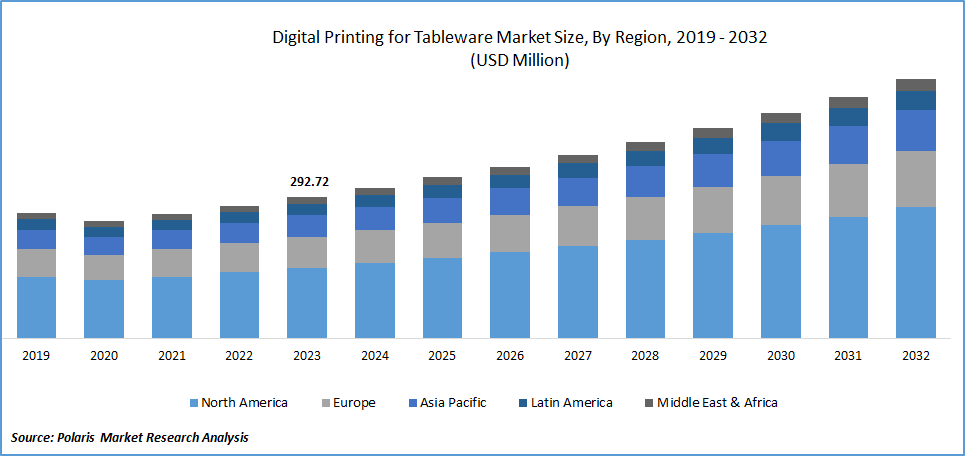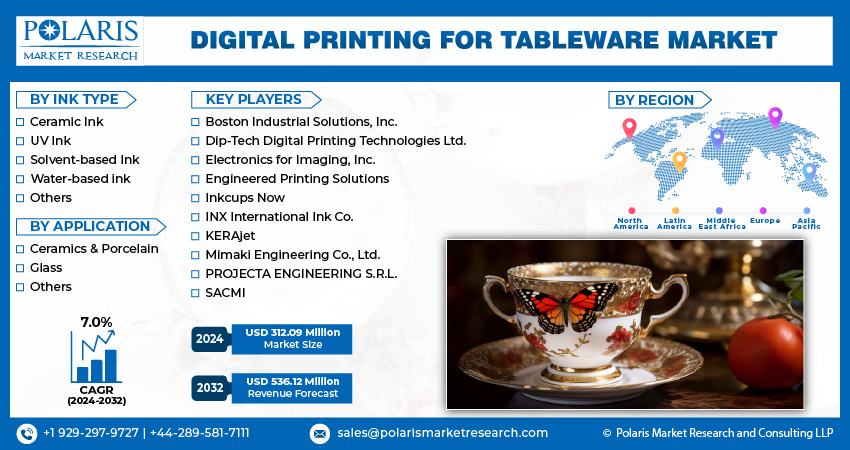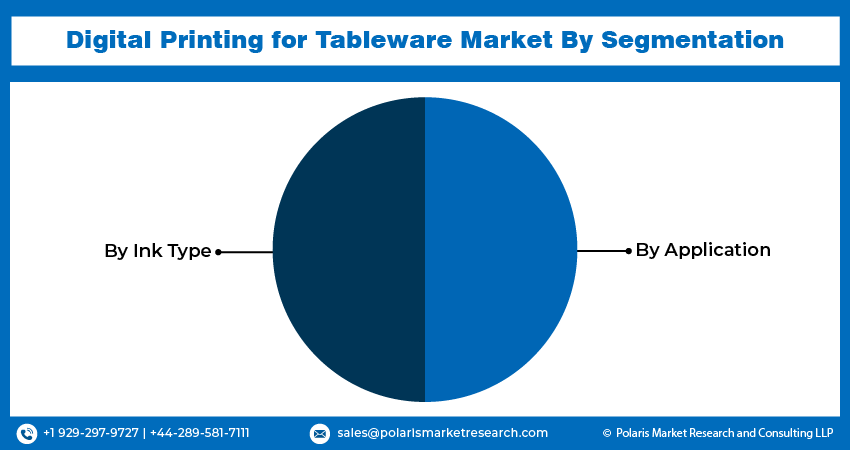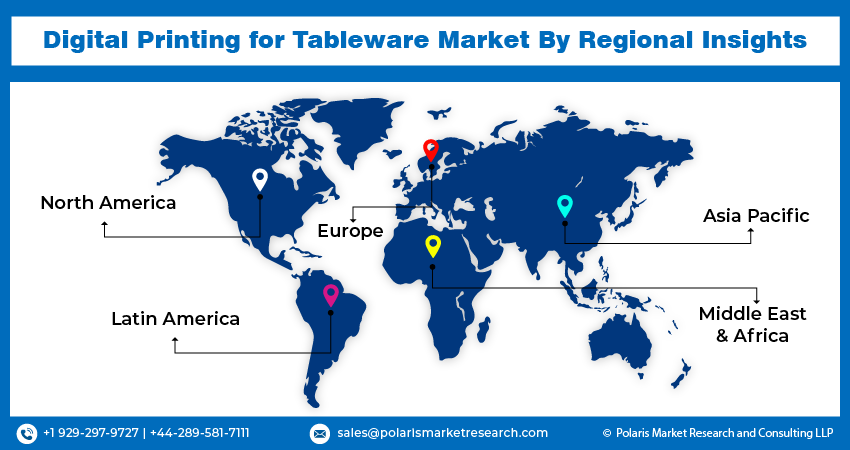
Digital Printing for Tableware Market Share, Size, Trends, Industry Analysis Report, By Ink Type (Ceramic Ink, UV Ink, Solvent based Ink, Others); By Application; By Region; Segment Forecast, 2024 - 2032
- Published Date:Feb-2024
- Pages: 120
- Format: pdf
- Report ID: PM4357
- Base Year: 2023
- Historical Data: 2019-2022
Report Outlook
The global digital printing for tableware market was valued at USD 292.72 million in 2023 and is expected to grow at a CAGR of 7.0% during the forecast period.
Key factors responsible for the market growth of digital printing, which is facilitated by higher viscosity fluids, are poised to transform various industries, spanning from vehicle decoration to textiles, packaging, inkjet technology, and printed electronics, unlocking extensive opportunities for manufacturers. Inkjet technology is diverse for various materials such as ceramic tile, paper, plastic, glass, textiles, and metal, and its recent application in additives embracing digital printing.
Furthermore, recent advancements in higher viscosity inks boosting the demand for digital printings; for example, Xaar’s latest 2002 printheads, featuring enhanced manufacturing processes and High Laydown Technology, offer cost-effective, high-quality printing and coating for various industrial applications with a through-flow ink path and high uniformity.

To Understand More About this Research: Request a Free Sample Report
In addition, in November 2023, digital printing technology is anticipated to accelerate for packaging by its operation efficiency, waste reduction compared to analog systems, ongoing improvements by equipment manufacturers, and reduced upfront costs facilitating a swift digital transition. Digital printing technology is poised to disrupt packaging qualitatively and quantitatively, offering advantages such as rapid realization of decorative designs from concept to printed image and a significant reduction in waste.
Some of the players in the market are taking initiatives to launch new technologies and expanding their technological advancements for high-quality printing solutions.
- For instance, In July 2023, SCREEN Graphic Solutions launched a series of label and packaging printing solutions at Labelexpo Europe 2023, featuring Truepress LABEL 350UV SAI technology in collaboration with Nilpeter, addressing industry trends with a focus on paper-based packaging over plastic for integrated digital printing and embellishment.
Beyond material concerns, ensuring compliance with food safety regulations is crucial in the tableware industry. Manufacturers must guarantee that inks and printing methods on food-contact products meet established standards. The utilization of digital printing offers a flexible solution for brands seeking unique and personalized tableware options. Manufacturers can produce customized tableware in both small production runs and mass production, contributing to the overall market growth.

Growth Drivers
- The rapid advancement of digital printing technology and the growing demand for customized solutions
Digital printing has experienced rapid and revolutionary market growth driven by rising technological advancement. Traditional printing methods are being replaced by digital printing technology due to their enhanced speed, versatility, and precision. The capabilities of digital printing techniques have improved high-performance printers and advancements in laser and inkjet printing technologies. Also, in this industry, some industry players are adopting digital printing due to its premium print quality and faster production speeds. For example, in October 2023, at PRINTING United Expo 2023 in Atlanta, Georgia, Vanguard Digital Printing Systems unveiled the VK3220T-HS, their newest UV-LED flatbed printer. This printer boasts ultra-high production capabilities and innovative features.
At the same time, the market is experiencing a surge in demand for personalized printing solutions. Both consumers and businesses are seeking personalized and custom products, ranging from apparel and decor to packaging and promotional materials. For example, In December 2023, Brands elevate packaging through digital printing's customizable and consumer-connecting options, meeting the growing demand for unique features and prompting investments in digital inkjet printing technologies across the supply chain.
Report Segmentation
The market is primarily segmented based on ink type, application, and region.
|
By Ink Type |
By Application |
By Region |
|
|
|
To Understand the Scope of this Report: Speak to Analyst
By Ink Type
- The UV ink segment is anticipated to hold the largest market share during the forecast period.
The UV ink segment is accounted to hold the largest market share over the forecast period. UV ink segment is propelled by its multiple advantages for printing on various substrates, including glass, metal, ceramic, acrylic, polycarbonate, flexible packaging, polystyrene, MDF, PVC, and thermoforming plastics, showing their versatility with inkjet printing systems. UV inks provide properties such as instance curing, adhesion, high print quality, color density, light fastness, and absence of volatile organic compounds. Even in high-speed printing, UV ink achieves vibrant and detailed print results.
Solvent-based inks segment is expected to hold the highest growth in the market. Solvent-based inks are recognized for their capacity to produce durable prints on a variety of materials, including plastics, glass, and ceramics. This means that the patterns on tableware can withstand regular washings and daily wear and tear.
Solvent inks are excellent at offering strong durability, especially in harsh environmental conditions, and they also show excellent resistance to heat and abrasion. This makes them incredibly well-suited for a wide range of applications, such as outdoor signage, packaging, and other products. Their versatility includes producing high-impact graphics like car wraps, billboards, banners, and adhesive decals, in addition to printing jobs like packaging, labeling, and coding. These qualities of solvent-based ink are rising demand for this segment.
By Application
- The ceramic and porcelain segment dominated the market share in 2023.
The ceramic and porcelain segment dominated the market share and is expected to maintain its leadership during the entire forecast period. Ceramic and porcelain are widely utilized in tableware for digital printing as these materials boast strength, scratch resistance, and the ability to withstand high temperatures, making them highly sought-after in the food service industry. The glossy and smooth surface of ceramic and porcelain enhances their printability, facilitating the reproduction of intricate, high-quality designs. These distinctive attributes of ceramic and porcelain contribute significantly to the ongoing expansion of this market segment.
The glass segment is anticipated to hold the highest market growth rate over the forecasted period. Glass is becoming a growing trend in the creation of digitally printed tableware because of its sleek and translucent qualities. Glass not only gives a contemporary and sophisticated aesthetic but it also makes it possible to create distinctive and eye-catching designs, which is one reason because this market is seeing an increase in demand. Glass's transparency offers a unique surface on which digital printing can be applied, allowing for the creation of sophisticated and personalized tableware.

Regional Insights
- North America region dominated the global market analysis in 2023.
North America dominated the market share in 2023. The region is growing at a rapid pace due to shifting consumer preferences, technology breakthroughs, and the demand for more individualized and effective printing solutions. For instance, in the retail sector, customers have begun to recognize and respond highly to labels and packaging that are personalized for themselves. Furthermore, In January 2019, Tetra Pak full-color digital printing on beverage carton packages, partnering with Koenig & Bauer, offering enhanced customization, flexibility, and quicker design-to-print processes for beverage brands.
The implementation of digital printing technologies, such as toner- and inkjet-based systems, has enabled companies to expedite market demands and optimize their printing procedures. Moreover, the expansion of digital printing in North America is attributed to the development of e-commerce and online marketing.
Asia Pacific region is anticipated to hold the highest CAGR during the forecast period. Digital printing technology is gaining popularity in various industries, including the production of tableware in China, Japan, India, and South Korea. For instance, In May 2022, HP India debuted three digital presses, including the flagship HP Indigo 15K, HP Indigo 100K, and HP Indigo 6K at Printpack India 2022, with a notable presence and positive industry response. Moreover, the region has a strong manufacturing infrastructure, technological advancements, and a rising demand for customized and unique designs.

Key Market Players & Competitive Insights
Key players in the market are investing in research and development to enhance digital printing technologies, with a focus on improving UV-curable and water-based inks. The ability to offer high-quality, sustainable, and customizable solutions for various tableware materials has become a critical factor in driving competitiveness. Advancements in digital printing technologies have led to increased efficiency and reduced production costs, making it a more attractive option for manufacturers.
Some of the major players operating in the global market include:
- Boston Industrial Solutions, Inc.
- Dip-Tech Digital Printing Technologies Ltd.
- Electronics for Imaging, Inc.
- Engineered Printing Solutions
- Inkcups Now
- INX International Ink Co.
- KERAjet
- Mimaki Engineering Co., Ltd.
- PROJECTA ENGINEERING S.R.L.
- SACMI
Recent Developments
- In April 2023, Inkcups launched the Helix ONE globally. It is a compact version of its Helix line of direct-to-object printers. This innovative benchtop digital cylinder printer is designed to provide efficient, high-quality printing on various cylindrical objects to cater to diverse industry needs. It features Inkcups' patented technology and is a groundbreaking addition to the market.
- In September 2021, Marabu, Koenig, and Bauer partnered to create a digital printing solution for the glass that is set to revolutionize the manufacturing of textured decorations. This innovative inkjet solution allows for direct printing on highly customized glass items and eliminates the need for expensive, custom molds.
Digital Printing for Tableware Market Report Scope
|
Report Attributes |
Details |
|
Market size value in 2024 |
USD 312.09 million |
|
Revenue Forecast in 2032 |
USD 536.12 million |
|
CAGR |
7.0% from 2024 – 2032 |
|
Base year |
2023 |
|
Historical data |
2019 – 2022 |
|
Forecast period |
2024 – 2032 |
|
Quantitative units |
Revenue in USD million and CAGR from 2024 to 2032 |
|
Segments Covered |
By Ink Type, By Application, By Region |
|
Regional scope |
North America, Europe, Asia Pacific, Latin America, Middle East & Africa |
|
Customization |
Report customization as per your requirements with respect to countries, regions, and segmentation. |
FAQ's
key companies in Digital Printing for Tableware Market are Boston Industrial Solutions, Dip-Tech Digital Printing, Electronics for Imaging., Engineered Printing Solutions, Inkcups Now, and SACMI
The global digital printing for tableware market is expected to grow at a CAGR of 7.0% during the forecast period.
Digital Printing for Tableware Market report covering key segments are ink type, application, and region.
the key driving factors in Digital Printing for Tableware Market is rapid advancement of digital printing technology and the growing demand for customized solutions
The global digital printing for tableware market size is expected to reach USD 536.12 million by 2032
